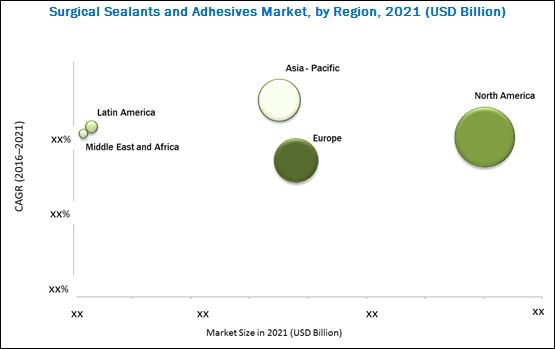Global Surgical Sealants And Adhesives Market To Grow At A CAGR Of 9.6% In Healthcare Sector
Growing prevalence and incidence of various disorders such as obesity and CVDs, increasing incidence of trauma, growth in the number of accidents, rising need to manage blood loss in patients, growth in the number of surgeries, and rising geriatric population.
How is Growth of Surgical Sealants and Adhesives Market?
The global surgical sealants and adhesives market is estimated to grow at a CAGR of 9.6% from 2016 to 2021 to reach $2.96 Billion by 2021. In addition, the greater uptake of technologically advanced products and growing adoption of surgical sealants and adhesives in the U.S. and Europe (owing to FDA and CE Mark approvals) are responsible for driving the overall growth of this market.
What Report Covers of Surgical Sealants and Adhesives Market?
the surgical sealants market is segmented on the basis of product, indication, application, and region. On the basis of product, the market is segmented into natural/biological sealants and adhesives and synthetic & semi-synthetic sealants and adhesives.
The natural/biological sealants and adhesives segment is further divided into type and origin. Based on type, the natural/biological sealants market is segmented into polypeptide/protein-based and polysaccharide-based sealants and adhesives.
The polypeptide/protein-based sealants segment consists of fibrin, gelatin, collagen, and albumin-based adhesives, while the polysaccharide-based sealants comprise of chitosan-based and other polysaccharide-based adhesives.
Among the polypeptide sealants and adhesives, the fibrin-based adhesives accounted for the largest share of the market due to the wide application of these sealants in surgical areas such as cardiac, liver, spleen surgeries, colonic anastomosis, and seroma prevention after soft tissue dissections. Also, the gelatin-based adhesives segment is expected to grow at the highest CAGR during the forecast period due to their high elasticity and high-adhesive & tensile strength.
Download PDF Brochure – https://www.marketsandmarkets.com/pdfdownloadNew.asp?id=38230314
Segments
On the basis of indication, the surgical sealants market is segmented into surgical hemostasis, tissue sealing, and tissue engineering. The tissue sealing segment accounted for the largest share of the market in 2015. The growth of this segment is attributed to the increasing number of surgeries being performed annually, rising prevalence of lifestyle diseases, growing number of people suffering from low back pain and sports-related injuries.
Applications
On the basis of application, the surgical sealants market is segmented into CNS, general, cardiovascular, orthopedic, cosmetic, urological, pulmonary, ophthalmic surgeries, and other applications. The cosmetic surgeries segment is expected to grow at the highest CAGR during the forecast period due to increasing number of cosmetic procedures and burn treatment surgeries taking place across the globe.
Request for Sample Pages – https://www.marketsandmarkets.com/requestsampleNew.asp?id=38230314
Geographical Regions Covered
Geographically, the global market is segmented into North America, Europe, Asia-Pacific, and the Rest of the World. In 2015, North America commanded a major share of the surgical adhesives market. However, Asia-Pacific is expected to witness the highest growth during the forecast period.
Growth in the Asia-Pacific market can be attributed to the rising geriatric population, rapid industrial growth, growing focus of key market players on emerging APAC countries, and rising demand for surgical interventions are some of the major factors driving the growth of this market. Moreover, the growing rate of adoption of advanced medical products owing to rising demand for quality healthcare in this region is aiding the market growth.
Know more about Surgical Sealants and Adhesives Market


Comments
Post a Comment
If you have any issue, Let me know ?